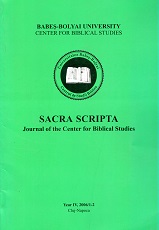Das Phänomen der „Versuchung“ bei den Stoikern und
bei Paulus
The Phenomenon of "Temptation" in Stoic Writings and in Paul
Author(s): Zsolt KovácsSubject(s): Christian Theology and Religion
Published by: Universitatea Babes-Bolyai - Centrul de Studii Biblice
Summary/Abstract: This study deals with the cultural, social and religious context of the theme of temptation within Stoic philosophy as background for Paul’s doctrine about temptation. The analysis departs from K. Jaspers’ theory of cultural change (the „Achsenzeit”). In this context the Hellenistic humanitas greaca is discussed, mainly because it seems to be the first reference to freedom, essential for the ethical judgment of human acts. The Stoics direct the attention from the external condition of the state, society or religion toward the inner world: the person should find his/her steadfastness against Hellenistic cosmopolitism in himself/herself. Knowledge regarding the psycho¬logical element of human acts is perhaps the most important pre¬requisite to understand temptation from its Stoic background. In Stoic philosophy we cannot properly speak about temptation, since the concept of sin is unknown, and only human failure (like in Aristotle) is addressed. The consent (sugkata,qesij), i.e. the point where the person chooses or rejects an action is the context where „temptation” can occur. The Stoic ideal of indifference and self-efficiency serves as preparation for Paul to proclaim the steadfastness in the temptation.
Journal: Sacra Scripta
- Issue Year: IV/2006
- Issue No: 1+2
- Page Range: 79-99
- Page Count: 21
- Language: German
- Content File-PDF

